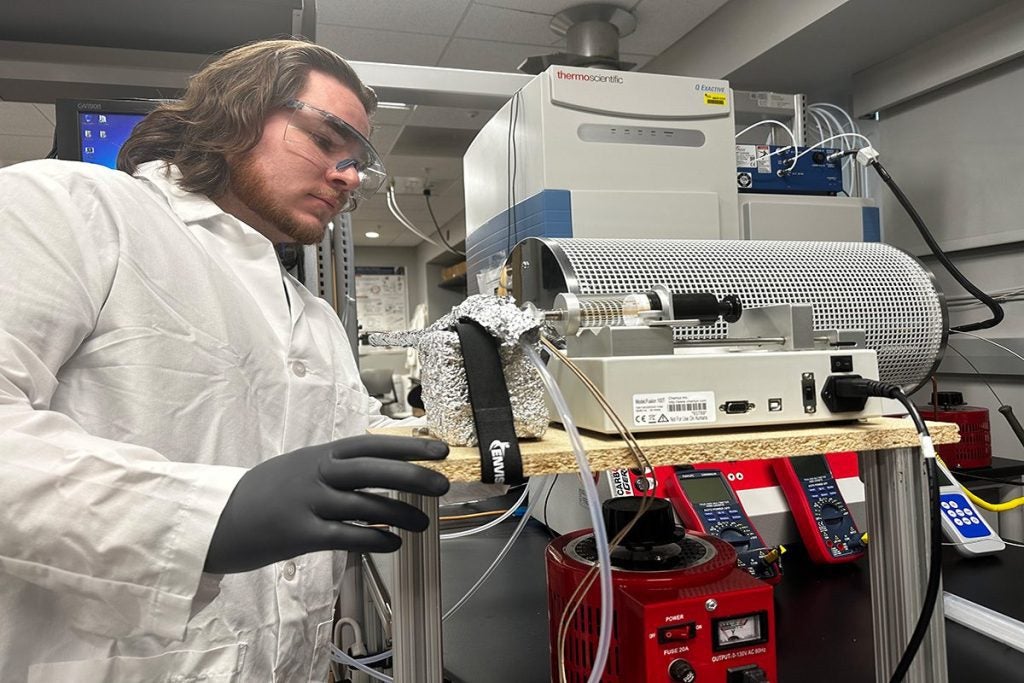Doctoral Chemistry Student Selected for the Department of Energy, Office of Science Graduate Student Research Program
Alec DeCecco, a graduate student in the Department of Chemistry, is investigating the impacts of Criegee intermediates on climate change
By: Emily Dougherty | October 29, 2024

Alec DeCecco conducting research in a lab.
Since the beginning of his undergraduate studies at UCF, Alec DeCecco, now a Ph.D. student in the Department of Chemistry, has spent his time in a research lab investigating Criegee intermediates (CIs) and the effects they can have in the atmosphere, particularly on climate change. He says this research is what inspired him to continue with his doctoral degree.
“I signed up to do research in Dr. Popolan-Vaida’s laboratory as an undergraduate student; and shortly after, I became enamored with it,” DeCecco says. “Once I started making discoveries and learning new things, I became so passionate and curious to understand more that I decided to pursue a Ph.D. and continue the work I started as an undergraduate student.”
DeCecco says that CIs are small molecules that have large impacts, so further study can add to a better understanding of their impact.
“These intermediates have big impacts in atmospheric and combustion chemistry,” DeCecco says. “In the atmosphere, CIs are produced as a result of reactions between ozone and unsaturated compounds emitted either from man-made or natural sources. CIs play a critical role in the atmosphere because they can lead to the production of hydroxyl radicals, which is the main oxidizer of the atmosphere, or to the formation of secondary organic aerosols (SOA) which can have negative impacts on local and global climate.”
Understanding the reactions of CIs with other atmospheric species, particularly the pathways that lead to SOA formation, will help assess the potential impact of CIs on the climate. However, these are very complex reactive systems.
“So, every bit of research that is performed is to understand their chemical behaviors is urgent and necessary,” DeCecco says.
DeCecco is one of 62 students in the country selected for the Department of Energy, Office of Science Graduate Student Research Program. He says that this opportunity will give him access to new resources, knowledge, and experience that will enhance his scientific career.
“I’m incredibly grateful for this opportunity and the chance to perform experiments that will complement the work I am doing here at UCF,” DeCecco says. “It will allow me to learn from and work with experts in the field to answer important scientific questions regarding the fate of CIs.”
DeCecco says that his time at UCF has had a significant impact on his research.
“There are a lot of people at UCF who will support you and keep you on the track that you want to be on,” he says. “Specifically, in Dr. Popolan-Vaida’s lab, I’ve been given amazing opportunities to perform cutting-edge research, including experiments at the Advanced Light Source, a world-renowned research facility.
Through his research, DeCecco has had the opportunity to interact with many scientists.
“This is how I met Dr. Nils Hansen, an expert in the field of combustion chemistry, and my host at Sandia National Laboratories,” he says. “I am excited to join his team for six months, use his equipment, and experience life at a national lab. Before I came to UCF, I never really thought about potentially working at a national lab.”
For students who are interested in starting research of their own, DeCecco says that enjoyment is a key factor to this huge commitment.
“I think the most important thing with research is that you have to be passionate about what you do,” DeCecco says. “You need to like your research setting, surround yourself with good colleagues, and get support from great mentors. If everyone around you is just as excited about your research as you are, it creates a fun and productive environment. I am lucky to have found all of this in Dr. Popolan-Vaida’s lab.”
